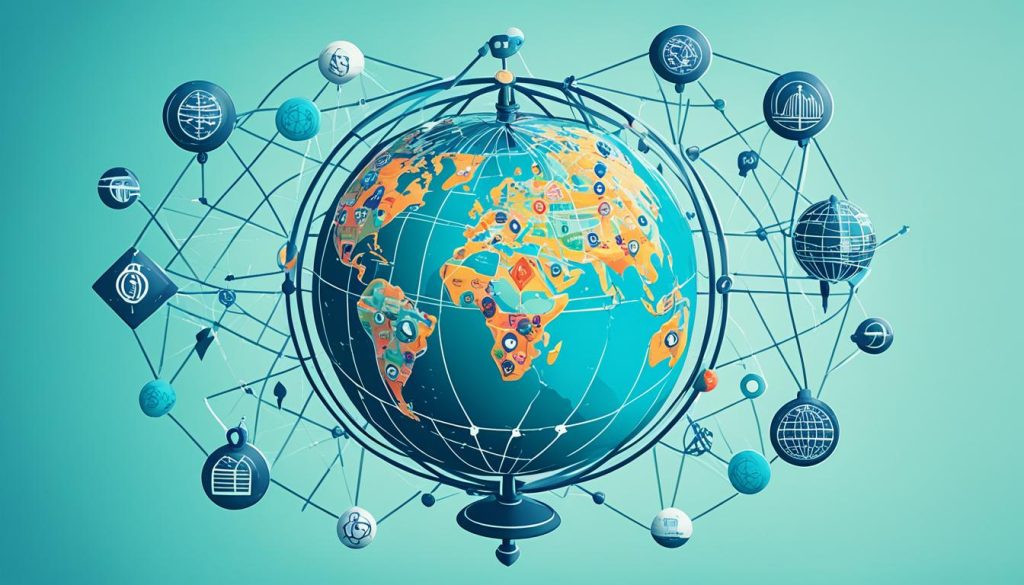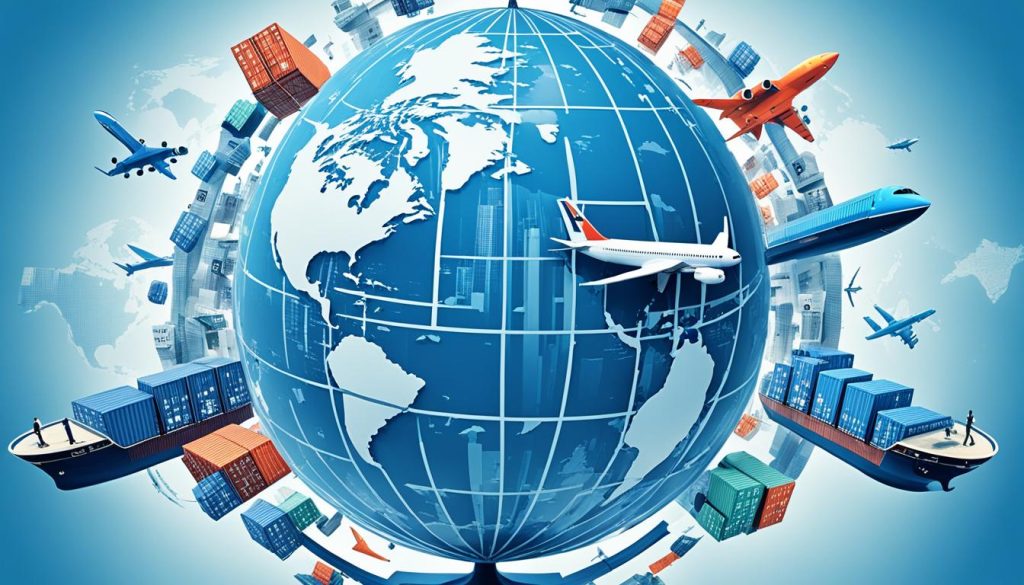As the sun set over London’s financial district, Evelyn headed to a meeting. She was eager about global banking, its network of services, and how it links the world. She was going to see the power of banking at a meeting with a big company.
The banking industry has changed a lot lately, offering more services worldwide. This piece looks at global banking, showing how banks help businesses, governments, and communities grow. It talks about the roles of different banks, the changes in the industry, and what they offer to make the world closer.
Listening keenly, Evelyn learned about the open access of global banking, its focus on clients, and its promise to the planet. Readers see a clear view of the global banking world. They’ll learn about its challenges, the chances it offers, and what the future may look like in this exciting field.
Key Takeaways
- The global banking industry has evolved significantly, offering a wide range of financial services to clients across borders.
- Financial institutions play a crucial role in facilitating international trade, investment, and economic growth.
- Global banks provide comprehensive banking solutions, including investment banking and transaction banking, to meet the diverse needs of their clients.
- Banks are uniquely positioned to help clients access opportunities in the rapidly growing markets of Asia and the Middle East.
- Sustainability, financial strength, and a client-focused approach are key priorities for global banks as they navigate a changing landscape.
Introduction to Global Banking
The world of finance has changed a lot. Now, banks are even more important in helping trade, investment, and growth happen worldwide. The global banking industry has moved from old ways to new, tech-savvy, and diverse ways of working.
Significance of Financial Institutions
Global banks and other financial institutions are vital for the global economy. They help money move, goods and services trade, and nations prosper. With their many services, they aid businesses, governments, and people in dealing with the world’s challenges.
Evolution of Global Banking
The banking world has evolved into a more connected, tech-focused, and varied field. Traditional models have given way to new, flexible approaches. Global banks now use digital tools to make their services better, their work smoother, and to offer more services. This change has made global banks central to the world’s economy, helping their customers succeed worldwide.
Comprehensive Solutions Across Borders
Today, global banks offer a wide range of services worldwide. They help all kinds of clients, from companies to governments. These services cover areas like investing, managing risks, and moving money around. So, organizations can deal with the ups and downs of the global money world more effectively.
Investment Banking Services
Global banks support clients in getting money, doing deals, and reaching new markets. They use their know-how and connections to help big and small players. This way, they can meet their goals and find new chances to grow.
Transaction Banking Solutions
Banks around the world help businesses trade internationally and handle cash smoothly. Their tools make it easier for companies to manage money and work smarter. This helps businesses be more efficient in the worldwide market.
Risk Management and Distribution
Global banks are ready to help their clients face financial challenges. They offer smart ways to manage different types of risks. With their large networks, they also help clients find new opportunities. As a result, their clients can become stronger and more competitive globally.
Unrivalled Access to Asia and Middle East
Global banks have a special place in connecting people to the vast opportunities in Asia and the Middle East. They have a solid global banking presence across over 60 countries. This makes it easy for their clients, whether in the West or East, to reach out to each other’s markets.
Asia and the Middle East are key in global trade and money movements. The efforts of global banks to expand internationally have given them deep knowledge about these areas. This lets them offer expert advice and solutions that help clients feel secure in these fast-changing markets.
These banks excel in many areas like helping with global trade and finding good investments. They are the go-to partners for businesses wanting to succeed in the Asia and Middle East markets. Their unique mix of broad access and deep knowledge truly stands out.
Global Banking: Explore the World of Financial Services
The global banking industry offers a range of financial services worldwide. It helps clients connect and expand across nations. Global banks use their knowledge, broad reach, and various products to meet customer needs.
Looking for advice on investment banking, new ways in transaction banking, or managing risks better? The global banking world has many options for you. It helps customers enter new markets, improve money matters, and understand financial services better with experts’ help.
Global banks aim to provide international financial solutions. They help clients succeed in a world that is increasingly linked. By teaming up with these banks, both people and groups can make use of their in-depth knowledge, wide connections, and up-to-date technology to reach their financial targets and grow sustainably.
Client-Focused Approach
Global banks focus on their clients first. They aim to build strong relationships based on trust. By using their vast knowledge and connections, they offer advice and solutions. This helps their clients deal with the complex world of finance. Their client-first way of working sets them apart. It allows them to help the biggest companies, financial institutions, and governments.
Building Trust and Relationships
Global banks put building trust at the core of what they do. They listen to what their clients need and want. Then, they create special financial plans just for them. This teamwork, built on openness and responsibility, creates lasting trust and loyalty. It goes beyond just doing business together.
Intellectual Capital and Research
Global banks excel in smart ideas and research. Their knowledge and global view give valuable insights. This info helps make important business decisions. By focusing on new ways and being creative, they can predict and meet their clients’ changing needs. This approach helps their clients grow and do well.
Sustainability in Global Banking
Global banks today are focusing more on sustainability. They are working closely with clients to move towards a future of lower emissions. These banks see the need to fight climate change. They are working with clients, especially in high-emission and new markets, to find solutions for reducing their carbon impact.
Supporting Transition to Lower Emissions
At the lead in sustainable banking, global banks offer green finance solutions. These help their clients lessen their carbon use and move to more sustainable practices. Through their skills and worldwide network, they offer creative finance choices. For instance, they provide sustainable loans and green bonds to back their clients’ efforts against climate change.
Climate Tech and Infrastructure Finance
Besides aiding clients in lowering emissions, global banks fund climate technologies and key clean energy investment projects. They put money into these sectors to boost the switch to a sustainable global economy. This helps in the broad use of new solutions to tackle climate change’s challenges.
Robust Financial Strength
Global banks rely on a strong capital base and quality risk management. This lets them invest in new technology and people. They do this to keep supporting their clients even through hard times.
Strong Capital Base
Global banks stand on a sturdy capital foundation. They carefully manage risks and aim for profitable growth. This financial power gives clients peace of mind. It shows they can face economic challenges and still meet people’s banking and financial needs. These banks show their dedication to careful banking and lasting success through their solid finances.
Resilience in Turbulent Times
The last few years have been tough for banks, hit by COVID-19 and other shocks. Yet, their focus on managing risks well and adapting has helped them survive. They keep meeting client needs by staying financially strong and using smart ways to reduce risks. So, they support businesses, communities, and economies even when times are hard.
Navigating Global Banking’s Future
The future of global banking is influenced by many things. This includes big changes in the world economy and fast technological growth. With interest rates and inflation going up, banks worldwide face tough times. They need to be smart and strong to deal with these big economic shifts. Meanwhile, new tech is shaking up the banking world. This brings both chances to grow and challenges to overcome.
Macroeconomic Environment Shifts
The world economy is changing a lot. Central banks are increasing interest rates to fight inflation. This big change means global banks have to rethink their plans. They need to stay profitable and serve their customers well. Dealing with rising interest rates and inflation is key. It will help banks keep up and stay strong against these economic challenges.
Technological Advancements
Technology is moving forward fast. This is changing how global banking works. New tech brings chances for banks to do better and lower their costs. Banks worldwide are using these new technologies to work better. They want to give customers a great experience and be leaders in a changing industry.
Staying on top of economic and tech changes is vital for global banks. With the right moves, they can be successful in the finance world. They need to be quick and smart to meet their customers’ needs well.
Regulatory Scrutiny and Systemic Risk
The world’s financial system is facing more challenges and risks. Governments worldwide are increasing their watch over both traditional and new-age financial firms. This focus aims to tackle new risks and keep the financial world stable. Banks must stay keen on new rules and keep clients’ needs in mind.
More attention is on making the financial world safer. Tougher rules are in place to stop one bank from causing a big problem. Banks need to watch these rules and make sure they’re strong enough, manage risks well, and report things clearly.
Helping prevent big financial problems is key for global banks. They work with others to spot and stop new risks, like those from online finance or complex markets.
The rulebook for banks is always changing. They must follow the rules but also be flexible to meet what their clients need. Being ahead in working with regulators can help banks shape a safer future for finance.
The Great Banking Transition
The world’s banking scene is changing a lot. More and more, banks are putting their money and work in places other than their own books. These include different funds, like insurance, pensions, and wealth funds. Also, they’re using more private money. This change, often called the growth of off-balance sheet assets, is a big deal. It’s shifting how we view banking.
Off-Balance Sheet Growth
Banks are getting smarter about how they use their money and what they buy. They’re putting assets in other places to manage their risks and costs better. This keeps them flexible but means they’re not overseen as closely by financial regulators. The balance, then, shifts outside the direct control of the experts.
Shift in Transactions and Payments
The way we pay and trade is also changing. Digital payment processing is exploding. Fintech firms and new digital wallets are giving banks a run for their money. Banks need to step up and use their experience to keep up and offer better services. The playground is changing, and everyone needs to adapt.
This mix of moving finance off the books and changing how we spend and trade is huge. It’s a major shift for the banking world. But it’s also a chance for banks to do better. Those who figure it out and grab the new chances will lead the incoming years.
Geographic Divergence in Banking Performance
Global banks show big differences in their performance around the world. Banks in the area around the Indian Ocean, from Singapore to parts of Africa, are doing very well. But those in Europe, the US, China, and Russia find it hard to make enough money. This shows how different parts of the world offer banks various chances and challenges.
In the emerging markets like those around the Indian Ocean, banks are seeing good times. This is thanks to strong economic growth, friendly rules, and more people needing banking services. Yet, banks in older markets face tough times. They deal with things like low rates, lots of competition, and strict rules. These make it hard for them to do as well.
The gap in how banks do in different places shows how vital it is for them to have a wide global reach. It’s key for them to be flexible and adjust their plans to each place’s needs. Using their experience and resources worldwide, these banks can find new chances in growing areas. They can also deal with the problems in more settled places.
Challenges and Opportunities Ahead
Global banks are in a fast-paced financial world, meeting many hurdles and chances. They can boost their work and cut costs by using advanced tech like AI. This is vital in today’s banking challenges. By reviewing their activities and improving strategies, banks can satisfy changing client needs. And they can grab the banking opportunities these changes bring.
Exploiting Leading Technologies
Technology, especially AI, opens big doors for banks to do better. They can make work easier, faster, and smarter by using AI. This means happy clients and staying ahead in the digital game. Using top tech is key to success in the banking world right now.
Flexing the Balance Sheet
Banks need to change how they manage their money to meet client needs. By changing certain tasks and finding new ways to get funds, they can be quicker and more adaptable. This clever money handling helps banks face troubles and pick up new chances.
Scaling Transaction Business
Digital payments are growing fast, making a big chance for banks in transaction business. If they grow this part of their business and use their skills well, banks can help clients move forward. They can become strong allies for businesses crossing borders.
The banks that find their way through these tough times and see the possibilities will do well. They’ll add value to clients, shareholders, and the world around them.
Priorities for Financial Institutions
Global banks are focusing on key priorities for the future. They aim to build a distribution model that puts customers first. This model will use the latest tech and data to understand and meet clients’ changing needs better.
Customer-Centric Distribution
In a world where competition is high, banks are making their customers their top priority. They are using data and new tech to know what clients want and need. This lets them offer better products and services. It also helps them build stronger relationships with customers worldwide.
Adapting to Evolving Risk Landscape
Beyond prioritising customer needs, banks are focusing on managing risks that are always changing. With new economic, regulatory, and tech risks, banks need to stay alert. They are improving their risk management skills. This ensures their business stays strong. It also keeps their customers’ money safe as they move through global financial challenges.
By working on these two areas – focusing on customers and managing risks well – global banks are becoming more resilient. They are better equipped to serve clients worldwide, showing their importance in the international financial scene.
Conclusion: Embracing Change in Global Banking
The global banking industry is changing a lot. This change is because of big economic shifts, new technologies, and changing rules. Banks that can adapt and use their strengths well will do great in the future.
By providing great services to their clients and focusing on being sustainable and strong, banks can help the world economy grow. It’s really important for banks to be able to change fast. This is because technology is always evolving and people’s needs are changing.
Those banks who adapt well, use their money smartly, and really focus on their clients will succeed in the future. The banking world is always changing. Banks that can stay flexible and keep up with the changes will be the most helpful and successful.















